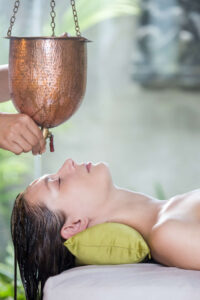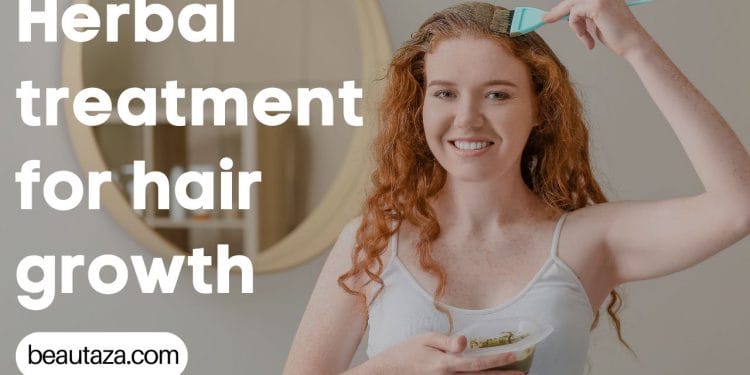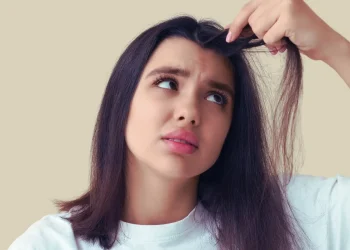
Are you sick and weary of dealing with thinning hair and dull locks? It’s time to discover the marvels of herbal hair growth treatments and rely on nature’s abundant resources. More and more individuals are looking for natural options that nourish their hair and encourage its development in a world overrun with chemical-filled hair products. A comprehensive approach to hair care is provided by herbal therapies, which target the underlying reasons for hair loss and provide essential nutrients to revive your mane. In this blog article, we’ll explore Herbal treatments for hair growth and walk you through growing healthy, colorful hair without chemicals.
Understanding Hair Growth and Loss
Hair follicles naturally develop and fall out. Understanding the mechanics helps fix hair problems and grow hair.
The Hair Growth Cycle:
Hair grows during the anagen phase when hair follicles actively generate new hair cells. Hair grows half an inch every month and lasts two to seven years.
Catagen Phase: This brief phase lasts a few days or weeks. Contracting hair follicles cut off blood flow and impede hair growth.
Telogen, or resting, lasts two to three months. The hair follicle rests before shedding and growing new hair.
Factors Influencing Hair Growth:
Genetics: Genetics affect hair growth, thickness, and hair loss susceptibility.
Hormones: Menopause, pregnancy, and polycystic ovarian syndrome (PCOS) may disrupt hair growth cycles.
Nutrition: A balanced diet rich in vitamins, minerals, and proteins promotes hair growth. Hair loss may result from nutritional inadequacies.
Healthy scalps promote hair development. Dandruff, infections, and oily scalps may slow hair growth.
Stress, smoking, heat styling, and harsh chemicals may damage hair follicles and cause hair loss.
Common Causes of Hair Loss:
Androgenetic alopecia, or male or female pattern baldness, causes most hair loss. Dihydrotestosterone (DHT) sensitivity is inherited.
Illness, surgery, hormones, or stress cause symptoms. It thins and loses hair severely.
Alopecia areata occurs when the immune system attacks hair follicles.
Nutritional deficiencies may cause hair loss.
Thyroid, scalp, and hormonal issues may cause hair loss.
Essential Herbs for Hair Growth
Nature gave us several hair-growing plants. Herbs may nourish the scalp, promote hair development, and more. Explore some essential herbs that may benefit your hair.
Aloe Vera: This versatile plant calms and hydrates. Restoring scalp pH may reduce inflammation and promote hair growth. Aloe vera enzymes encourage hair follicle health and development in dormant follicles.
Rosemary: This aromatic herb stimulates the scalp. It increases circulation, which brings nutrients to hair follicles and promotes growth. Rosemary also protects hair and scalp from free radical damage.
Nettle: Nutrient-rich nettle strengthens hair follicles to reduce hair loss and promote thicker, healthier hair growth. It contains iron, silica, and vitamins A, C, and K essential for healthy hair.
Saw Palmetto: This plant treats hair loss caused by androgenetic alopecia. It prevents testosterone from converting into hair-loss-causing dihydrotestosterone (DHT). Saw palmetto lowers DHT and promotes hair growth.
Horsetail: High-silica herbs may strengthen and supple hair. It also improves blood circulation to nourish hair follicles. Horsetail’s high silica content may help thicken and strengthen hair.
Ginseng is a stress-reducing adaptogenic herb. Ginseng indirectly promotes hair growth by decreasing stress. It also boosts blood flow and nourishes hair follicles.
DIY Herbal Treatments for Hair Growth
It’s simpler than you would think to harness the power of herbs to promote hair growth. Your hair may be nourished and encouraged to thrive with the help of a few inexpensive substances and a little imagination. Here are some homemade hair-growth recipes that include essential herbs:
Mask made with aloe vera:
Ingredients:
Amount of fresh aloe vera gel: 2 teaspoons
Coconut oil, 1 tbsp
Honey, one teaspoon
Instructions:
Combine all the ingredients in a bowl and stir until a paste forms.
Apply the mixture well, covering your scalp and hair.
For a few minutes, gently massage the area to promote circulation.
For between 30 and an hour, leave the mask on.
Use your regular shampoo and lukewarm water to rinse thoroughly.
Oil With Rosemary Infused:
Ingredients:
14 cups of rosemary leaves, dried
1 cup of carrier oil, such as coconut or olive oil
Instructions:
Put the dried rosemary leaves in a clean, airtight container.
In a saucepan, warm (not boiling) the carrier oil.
Over the rosemary leaves in the container, drizzle the heated oil.
After carefully sealing the container, infuse the ingredients for 2-4 weeks in a cold, dark spot.
Transfer the oil to a fresh bottle after straining it.
Before bed, massage a tiny quantity of rosemary-infused oil into your scalp for 5 to 10 minutes. After leaving it on all night, wash your hair the following day.
Integrating Herbal Hair Care into Your Routine
Integrating herbal hair care into your regimen is a comprehensive strategy that may significantly improve your health and encourage the development of your hair. The following advice may help you easily include herbal remedies into your current hair care routine:
The Best Herbs to Use Depending on Your Hair Type and Concerns:
Herbs with varying qualities may address various hair issues and kinds of hair. Aloe vera or rosemary might have calming and hydrating properties if you have a dry scalp. Herbs like nettle or saw palmetto may help with hair loss issues. Choose herbs based on your research and individual requirements.
Individualize herbal remedies:
Feel free to explore and adjust herbal remedies to your liking. To make a mixture that works best for your hair, you may mix different herbs or change the proportions of the ingredients. For additional benefits and a lovely scent, consider using essential oils like lavender or cedarwood.
Don’t use harsh chemicals or heat on your hair:
Use less harsh chemical products and heat-styling appliances to get the most out of herbal treatments. These may harm hair and counteract the advantages of herbal therapy. Use low-heat techniques like air-drying or embrace mild, natural shampoos and conditioners when feasible.
Controlling stress levels:
Stress may slow hair development and cause hair loss. Include stress-relieving activities, such as yoga, meditation, or hobbies, into your daily routine. When used physically or through aromatherapy, herbs like ginseng or lavender may also help reduce stress.
Conclusion
Herbal hair growth remedies address hair loss and preserve healthy, vibrant hair. Understanding the hair development cycle, factors affecting hair growth, and everyday hair loss causes may help us nourish our hair from the inside.
Aloe vera, rosemary, nettle, saw palmetto, horsetail, and ginseng stimulate and strengthen hair follicles, promoting healthy growth. DIY aloe vera hair masks, rosemary-infused oil, nettle tea rinses, and saw palmetto scalp tonics may nourish our hair with these plants.
Herbal hair care requires consistency, choosing the right herbs for our hair type and conditions, personalizing treatments, embracing scalp massages, eating a nutrient-rich diet, and decreasing harsh chemicals and heat styling. Controlling stress and prioritizing wellness improves hair health.
Herbal medicines may be beneficial, but everyone’s experience is different. If you have medical concerns or substantial hair loss, see a professional.
Read –











